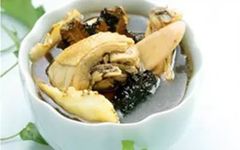1. Sha Shen Yu Zhu Fresh Huai Shan Stewed Old Chicken
Ingredients: Sha Shen (Glehnia Root) 10g, Yu Zhu (Polygonatum) 10g, Old Chicken half, Fresh Huai Shan (Chinese Yam) 200g, Lean Pork 100g, Dried Tangerine Peel 1/3 slice, Honey Dates 2 pieces, Salt to taste
Method:
1. Clean the old chicken and cut it into large pieces. Cut the lean pork into slightly larger pieces. Peel the Huai Shan and cut it into large chunks.
2. Boil water in a pot, add the chicken and pork pieces to blanch and remove blood.
3. In a clay pot, add 2000ml of water, then add the blanched old chicken, lean pork, Sha Shen, Yu Zhu, Huai Shan, dried tangerine peel, and honey dates. Bring to a boil over high heat, then reduce to low heat and simmer for 2 hours. Add salt to taste before serving.
Feature: Sha Shen and Yu Zhu are traditional ingredients for moistening dryness, combined with the spleen-strengthening and kidney-tonifying properties of Huai Shan, this soup is nourishing, calming, and beneficial for yin and qi.
Tips:
1. When peeling Huai Shan, wear gloves as its skin contains an allergenic substance that can cause skin irritation.
2. Sha Shen has the effects of nourishing yin, generating fluids, clearing heat, and cooling the blood.
3. Yu Zhu is sweet and moist, a good medicine for nourishing yin and generating fluids. The vitamin A in Yu Zhu can improve dry and rough skin, making it soft and smooth.
4. Huai Shan has multiple benefits including strengthening the spleen, nourishing the lungs, tonifying the kidneys, and benefiting essence. It can lower blood lipids and regulate the gastrointestinal tract, reducing subcutaneous fat accumulation.

2. Si Wu Stewed Chicken
Ingredients: Chicken legs 2, Dang Gui (Angelica Sinensis) 10g, Shu Di Huang (Rehmannia) 10g, Bai Shao (White Peony) 10g, Chuan Xiong (Szechuan Lovage) 8g, Salt 5g
Method:
1. Clean the chicken legs, cut them into small pieces, and blanch in boiling water for 2 minutes, then set aside.
2. Place the blanched chicken pieces in a clay pot, add Dang Gui, Bai Shao, Shu Di Huang, and Chuan Xiong, and stew for about 50 minutes until the chicken is tender. Add salt to taste before serving.
Feature: Although slightly bitter, the taste does not affect the delicious flavor and helps new mothers recover their bodies, promotes uterine contraction, and expels lochia.
Tips: New mothers with colds or heat constitution should avoid this stew.
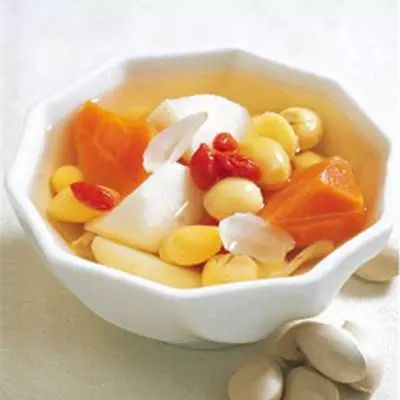
3. Huai Shan Ginkgo Lily Soup
Ingredients: Lily 15g, Fresh Huai Shan 200g, Dried Lotus Seeds 10 pieces, Ginkgo 8 pieces, Carrot 1, Goji Berries 5g, Rock Sugar 30g
Method:
1. Clean the fresh Huai Shan and carrot, peel, and cut into chunks. Clean the lily and remove the root, breaking it into small petals.
2. Blanch the ginkgo in boiling water for 3 minutes, then remove the shell and inner skin.
3. In a pot, add 2000ml of cold water, bring to a boil, then add the dried lotus seeds, ginkgo, carrot chunks, and fresh Huai Shan chunks, and simmer on low heat for 1 hour.
4. Finally, add rock sugar, lily, and goji berries, and continue to simmer for another 15 minutes.
Feature: Both Huai Shan and carrot have the effect of nourishing the spleen and stomach without causing heat or dryness. This soup is very suitable for the elderly and those with weak bodies during cold seasons.
Tips: 1. Ginkgo contains toxins; eating it raw can cause fever, vomiting, abdominal pain, diarrhea, convulsions, and difficulty breathing. Therefore, it must be thoroughly cooked before consumption, and should not be eaten in excess. Adults should not exceed 10 pieces per day, and children should avoid it. 2. Some people may have allergic reactions to Huai Shan, such as skin redness, swelling, and rashes, so caution is advised.
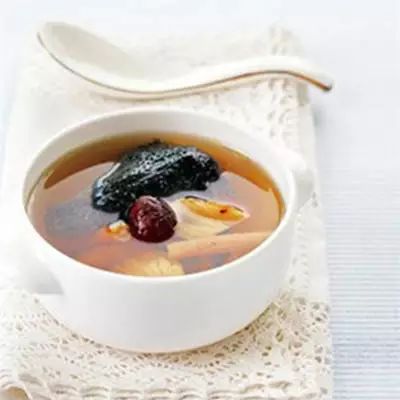
4. Bei Qi Dang Shen Stewed Black Chicken
Ingredients: Black Chicken half, Lean Pork 100g, Bei Qi (Astragalus) 3g, Dang Shen (Codonopsis) 3g, Red Dates 5 pieces, Dried Tangerine Peel 1 piece, Ginger 3 slices
Method:
1. Clean the black chicken under running water, chop into larger pieces, and blanch in boiling water for 3 minutes, then drain. Cut the lean pork into larger pieces as well.
2. Place Bei Qi, Dang Shen, red dates, dried tangerine peel, ginger, and the prepared black chicken and lean pork into a stewing pot, add 1500ml of water, bring to a boil, then reduce to low heat and simmer for 90 minutes. Add salt to taste before serving.
Feature: This soup, using Bei Qi and Dang Shen along with black chicken, enhances the effects of tonifying the spleen and qi, and increasing resistance.
Tips:
1. Do not add too much Bei Qi, Dang Shen, and dried tangerine peel to avoid affecting the soup’s flavor. 2. Bei Qi, also known as Huang Qi, is called “small ginseng” and has various effects including tonifying the middle, boosting qi, increasing resistance, preventing colds, diuresis, lowering blood pressure, and protecting the liver. 3. Dang Shen has the effects of tonifying the middle, boosting qi, and nourishing blood. It can be used to improve weakness and iron-deficiency anemia caused by various reasons.
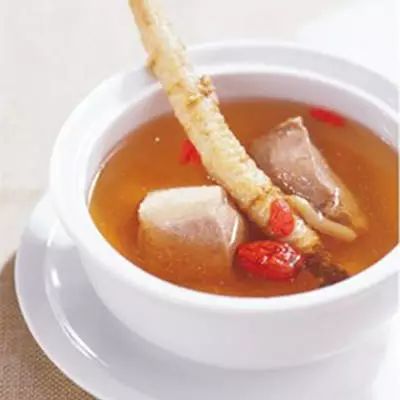
5. Sha Shen Mai Dong Stewed Old Duck
Ingredients: Old Duck 500g, Lean Pork 200g, Yu Zhu 10g, Longan Meat 10g, Dried Tangerine Peel 10g, Sha Shen 50g, Mai Dong (Ophiopogon) 20g, Ginger 1 piece, Salt to taste
Method:
1. Clean the old duck and lean pork, cut into 3cm cubes.
2. Soak Yu Zhu in cold water for 10 minutes, then remove.
3. Soak Sha Shen in cold water for 10 minutes, then remove.
4. Soak Mai Dong in cold water for 10 minutes, then remove.
5. Soak longan meat and dried tangerine peel in cold water for 10 minutes, then remove.
6. Place the old duck and lean pork in a soup pot, add enough cold water, bring to a boil, reduce to low heat, skim off the foam, then add ginger, Yu Zhu, Sha Shen, Mai Dong, longan meat, and dried tangerine peel, cover, and simmer for 2 hours. Add salt to taste before serving.
Feature: Duck meat is cool in nature, which can counteract floating and virtual fire, making a rich and nourishing soup to share with family for health. Contraindication: Avoid for those with a cold and weak constitution.
Tips:
1. Use high heat to boil the water in the soup pot; when it is about to boil, a lot of foam will appear on the surface, which should be skimmed off. Alternatively, blanch all ingredients in boiling water to remove blood and impurities before placing them in the soup pot with cold water to simmer again. 2. Mai Dong has a spindle shape, 1.5-3cm long, with a milky white or light yellow surface and fine longitudinal stripes, and a semi-transparent cross-section with a thin white core. Mai Dong nourishes yin, generates fluids, and moistens the lungs, which can treat dry cough, irritability, and insomnia. 3. Sha Shen has two types: Nan Sha Shen (Southern Glehnia) and Bei Sha Shen (Northern Glehnia). The one usually found in pharmacies is Nan Sha Shen. Both types have similar medicinal properties, nourishing yin, clearing the lungs, and benefiting the stomach. They can be used for dry cough with little phlegm caused by lung heat and yin deficiency, as well as for dry mouth and tongue caused by stomach heat injuring yin.
4. Yu Zhu: The Yu Zhu sold in pharmacies is made from the dried root of the Polygonatum plant, appearing as slightly flattened cylindrical or round slices, with a light yellowish and slightly translucent skin. Yu Zhu has the effects of nourishing yin, moistening dryness, relieving irritability, and quenching thirst. When combined with Sha Shen, it can stop cough. Modern medical research shows that Yu Zhu also has blood sugar-lowering and skin-moisturizing effects.
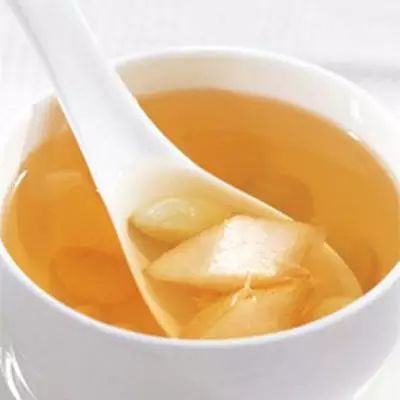
6. Chuan Bei Ginkgo Stewed Snow Pear
Ingredients: Snow Pear 3, Ginkgo 15 pieces, Chuan Bei Mu (Fritillaria) 20g
Method:
1. Clean the snow pears, remove the cores, and cut into 1cm cubes.
2. In a pot, add an appropriate amount of water, bring to a boil, then add ginkgo and blanch for 3 minutes, then remove the shell and inner membrane.
3. Place all ingredients in a clay pot, add 1500ml of cold water, cover, bring to a boil, then reduce to low heat and stew for 1 hour.
Feature: The throat-soothing and dryness-relieving properties of snow pear, combined with the cough-relieving effects of Chuan Bei, are very effective for persistent coughs. Regular consumption of this sweet soup not only soothes the throat but also provides a smooth and sweet taste that nourishes the heart.
Tips:
1. This sweet soup does not contain any type of sugar during cooking, resulting in a slightly bitter taste. However, adding sugar would reduce its therapeutic effects, so if you can accept the mild bitterness, there is no need to add additional seasoning. 2. Those with spleen and stomach deficiency and damp phlegm should avoid drinking this. 3. Ginkgo nuts have mild toxicity; it is advisable to limit consumption to no more than 7 pieces per person per day.
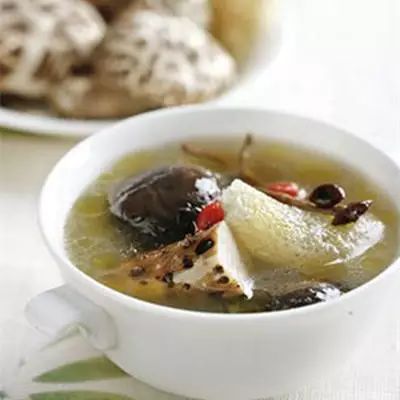
7. Huang Qi Mushroom Soup
Ingredients: Dried Shiitake Mushrooms 50g, Tea Tree Mushrooms 50g, Bamboo Fungus 3 pieces, Huang Qi (Astragalus) 5g, Goji Berries 5g, Olive Oil 15ml, Salt 10g, Huai Shan 2 pieces
Method:
1. Clean the shiitake and tea tree mushrooms, soak in cold water for two hours. If using small shiitake mushrooms, no need to cut; if using large ones, cut them in half after soaking. Reserve the soaking water.
2. Clean the Huai Shan, no need to peel, cut into small sections.
3. Remove the netting from the bamboo fungus, soak in cold water, trim the ends, and cut into sections.
4. Place the soaked mushrooms, bamboo fungus, Huai Shan, and Huang Qi in a clay pot, bring to a boil, then reduce to medium heat and simmer for about an hour. Add goji berries, season with salt, and simmer for another hour. Finally, add olive oil, which will float golden oil droplets on the surface, enhancing the flavor and visual appeal, then turn off the heat.
Feature: The ingredients in this soup are rich, nutritious, and low in calories, with a strong mushroom aroma. Huai Shan is selected for its higher nutritional value.
Tips:
1. To enhance the soup’s flavor, choose dried shiitake mushrooms, as they have a stronger flavor than fresh ones. Do not discard the soaking water, as it can be added to the soup for more richness. 2. After the soup is done, add a teaspoon of olive oil to make the soup more nourishing.
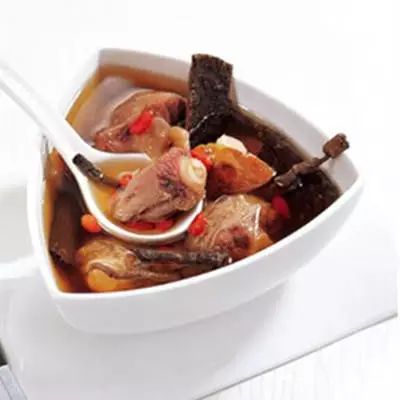
8. Ba Ji Du Zhong Stewed Oxtail
Ingredients: Oxtail 800g, Ba Ji Tian (Morinda Root) 25g, Du Zhong (Eucommia) 20g, Black Dates 6 pieces, Dried Tangerine Peel 1 piece, Longan 6 pieces, Goji Berries about 10 pieces, Salt 5g, White Peppercorns 5g
Method:
1. Cut the oxtail into large pieces, blanch in boiling water to remove blood, then clean and drain.
2. Clean the Ba Ji Tian and Du Zhong with water, then drain.
3. Clean the black dates, dried tangerine peel, longan meat, and goji berries with water, then drain.
4. In a pot, add 3800ml of water, bring to a boil, then add all ingredients (reserve goji berries and salt). Bring to a boil again, then reduce to low heat and simmer for 3 hours.
5. Finally, add goji berries and simmer for another 30 minutes, then season with salt before serving.
Feature: This soup is very suitable for winter consumption, nourishing the body and warming the heart. The Ba Ji Tian and Du Zhong in it are beneficial for strengthening bones and replenishing the kidneys in men.
Tips:
1. Ba Ji Tian: Also known as Ba Ji, San Man Cao, or Ji Chang Feng, is the dried root of the Ba Ji Tian plant, sweet and spicy, warm in nature, with effects of dispelling wind and dampness, strengthening bones, and tonifying the kidneys. It is often paired with Du Zhong, added to oxtail or pig tail to make soup. 2. Du Zhong: Also known as Si Xian or Si Zhong, is the bark of the Du Zhong tree. It is warm, slightly spicy, and has effects of tonifying the liver and kidneys, warming the uterus, and stabilizing the fetus, as well as treating symptoms like back pain and weakness in the knees. It is often paired with pig kidneys, either stir-fried or stewed, to nourish the kidneys.
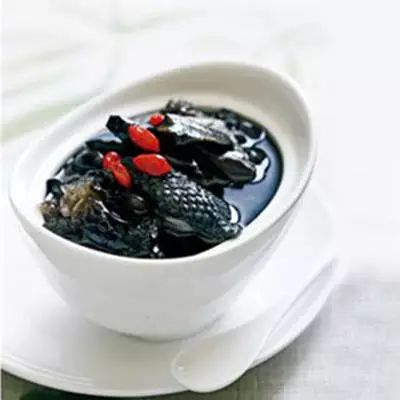
9. He Shou Wu Stewed Bamboo Chicken
Ingredients: He Shou Wu (Fo-Ti) 40g, Black Fungus 60g, Black Beans 40g, Bamboo Chicken 500g
Method:
1. Cut the bamboo chicken into pieces (20cm). Clean He Shou Wu, black beans, and black fungus. Blanch the bamboo chicken in boiling water to clean off blood. 2. Place the bamboo chicken and the other three ingredients in a container, adding enough water to cover the ingredients.
3. Bring to a boil over high heat, then reduce to low heat and simmer for 45 minutes. Season with a little salt before serving.
Feature: The combination of black beans, black fungus, and tender bamboo chicken creates an incredibly delicious soup.
Tips:
1. He Shou Wu is slightly warm, bitter, sweet, and astringent, with effects of nourishing the liver and kidneys, benefiting blood, and strengthening bones. It can also dilate coronary arteries, lower blood lipids, and promote red blood cell production, thus preventing coronary heart disease, hyperlipidemia, senile anemia, and brain degeneration. 2. The skin of black beans is black and contains anthocyanins, which are excellent sources of antioxidants that can eliminate free radicals in the body, especially in the acidic environment of the stomach, enhancing the antioxidant effect, beautifying the skin, and increasing gastrointestinal motility. Additionally, black beans are rich in protein, vitamins, and minerals, with effects of promoting blood circulation, diuresis, dispelling wind, and detoxifying. 3. Bamboo chicken, also known as black chicken, is neutral in nature and sweet in taste, with effects of nourishing yin, clearing heat, tonifying the liver and kidneys, and strengthening the spleen to stop diarrhea. It can also enhance physiological functions, delay aging, strengthen bones, and is effective in preventing and treating osteoporosis, rickets, and iron-deficiency anemia in women.
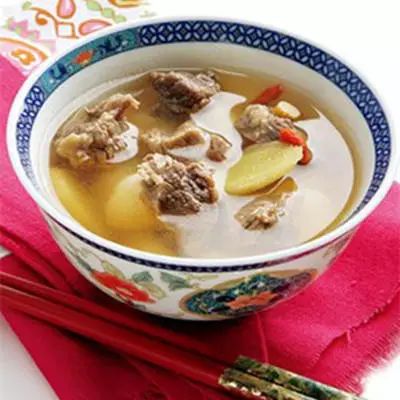
10. Dang Gui Lamb Stew
Ingredients: Dang Gui 10g, Lamb 400g, Red Dates 5 pieces, Carrots 2, Star Anise 2 pieces, Sichuan Pepper 20 pieces, Cooking Wine 15ml, Soy Sauce 15ml, Oil 15ml, Rock Sugar 10g
Method:
1. Clean the lamb and cut into 2cm cubes. Peel and cut the carrots into chunks. Clean Dang Gui and red dates.
2. Place the lamb in a pot, add enough cold water, bring to a boil, and remove the lamb once the blood foam is cleared.
3. Heat oil in a frying pan until 50% hot, add star anise and fry until fragrant, then add lamb, cooking wine, soy sauce, and enough hot water to boil, then transfer to a clay pot.
4. Add Sichuan pepper, rock sugar, and Dang Gui to the clay pot, cover, and simmer on low heat for 1 hour.
5. Add carrots and continue to simmer for another hour, then add salt and heat for another 10 minutes before serving.
Feature: Adding Dang Gui makes the flavor warm without being hot, enhancing both taste and health benefits.
Tips: Dang Gui has effects of nourishing blood, activating blood circulation, regulating menstruation, relieving pain, and moisturizing dryness. It also has excellent beauty benefits, being known as “the woman’s beauty medicine.”
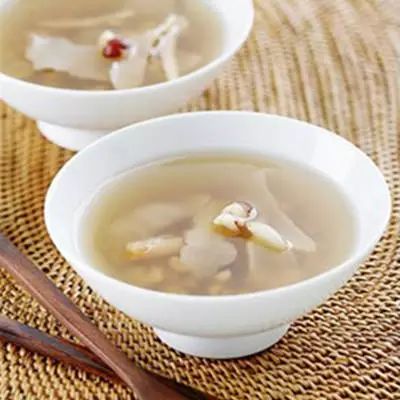
11. Qing Bu Liang Lean Meat Soup
Ingredients: Lean Pork about 100g, Sha Shen about 30g, Yu Zhu 30g, Job’s Tears 50g, Euryale 30g, Honey Dates 2 pieces, Dried Tangerine Peel 2 pieces
Method:
1. Sort and remove impurities from Job’s Tears, wash clean, and soak overnight. Clean the lean pork and drain.
2. In a clay pot, add enough water, then add all the ingredients.
3. Bring to a boil over high heat, then reduce to low heat and simmer for 2 hours until fragrant.
Feature: This Qing Bu Liang Lean Meat Soup benefits the organs, clears heat, and removes dampness, with very mild effects, suitable for consumption in all seasons. The soup has a slightly sweet taste, and no additional salt is needed for seasoning.
Tips:
1. The amount of water for the soup can be adjusted based on the number of people in the household. For a family of 4, use 4 bowls of water, plus 1-2 extra bowls. For 5 people, use 5 bowls of water plus 1-2 extra bowls. This soup has a relatively sweet taste and does not require additional salt for seasoning. 2. The ingredients for Qing Bu Liang are not uniform; some focus on strengthening the spleen and removing dampness, while others focus on nourishing the lungs. Ingredients can include Sha Shen, Yu Zhu, Euryale, Job’s Tears, and can also include Huai Shan, lotus seeds, and red dates. Those with weak constitutions and rising fire should especially consider adding Dang Shen.
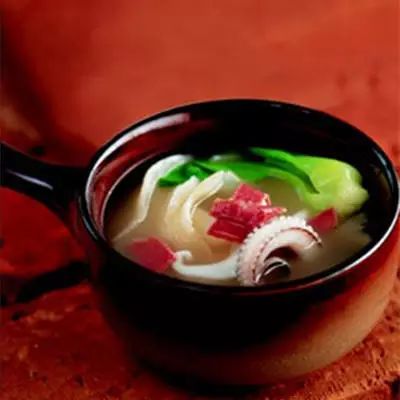
12. Tian Ma Stewed Oolong
Ingredients: Cuttlefish 500g, Tian Ma (Gastrodia) 15g, Jinhua Ham 30g, Bok Choy 100g, Scallion 1, Ginger 1 piece, Shaoxing Rice Wine 2 tablespoons, White Sugar 1 tablespoon, Salt to taste
Method:
1. Clean the cuttlefish, remove the bones, peel off the thin membrane, and cut into large pieces to place in the soup pot. Tie the scallion into a knot. Crush the ginger. Slice the Jinhua ham. Clean the bok choy and cut a cross at the root.
2. In the soup pot, add 3000ml of cold water, add the Jinhua ham slices, bring to a boil, skim off the foam, then add Tian Ma, ginger, scallion, Shaoxing rice wine, and white sugar, reduce to low heat, cover, and simmer for 80 minutes.
3. Add the cleaned bok choy, adjust to medium heat without covering, and simmer for 10 minutes before seasoning with salt before serving.
Feature: This Tian Ma Stewed Oolong has the effects of nourishing blood, dispelling wind, and nourishing yin while calming yang, suitable for both men and women. Cuttlefish is neutral and salty, with effects of nourishing blood, moistening yin, dispelling stasis, relieving pain, tonifying the kidneys, and promoting appetite. Tian Ma is a precious medicinal material, neutral in nature, with effects of calming wind and stopping tremors.
Tips:
1. Processing cuttlefish: Cuttlefish, also known as black fish, requires removal of the dark outer skin and the thin membrane attached to the white flesh, as this membrane can harden the texture of the cuttlefish when heated. 2. To prevent bok choy from discoloring: Add bok choy at the end without covering to prevent it from turning yellow.
Effects, Methods, and Dietary Contraindications of the Ingredients
Yu Zhu:
1. Effects: Nourishes yin, generates fluids, moistens the lungs, and nourishes the stomach. It has a heart-strengthening and blood-nourishing effect, improving blood circulation. Yu Zhu contains mucilage and vitamin A, which have anti-aging and skin-moisturizing effects. 2. Contraindications: Avoid for those with spleen deficiency and phlegm, and use cautiously for those with rapid heartbeat and high blood pressure. 3. Cooking methods: Can be stir-fried with celery or used in soups with chicken, clams, or pork.
Shu Di:
1. Effects: Treats anemia, shortness of breath, and tonifies the kidneys and nourishes yin. It can also improve chronic nephritis, high blood pressure, diabetes, and neurasthenia. 2. Contraindications: Do not consume frequently, as Shu Di is sweet and cloying, and long-term use may hinder digestion, potentially causing bloating and diarrhea. Avoid consuming with scallions, garlic, radishes, or pig’s blood. 3. Cooking methods: Can be used in soups with lamb, or in porridge, or in medicinal wine.
Huai Shan:
1. Effects: Suitable for those with qi deficiency. It is effective for fatigue, poor appetite, chronic cough, and symptoms of menopause in women, and also helps regulate blood sugar, making it suitable for diabetics. 2. Contraindications: Those with extreme heat constitution or severe constipation should limit intake, and those with acute diarrhea or colds should avoid it. 3. Cooking methods: Can be used in porridge or soups.
Dang Shen:
1. Effects: Can improve weakness caused by various reasons, iron-deficiency anemia, and chronic cough. 2. Contraindications: Should not be used with Li Lu. 3. Cooking methods: Can be added to soups with pork or oxtail, or cooked with rice and Huai Shan in porridge.
Mai Dong:
1. Effects: Effective for chronic bronchitis and chronic pharyngitis. It also has effects of clearing heat, relieving summer heat, calming the heart, promoting sleep, lowering blood sugar, softening blood vessels, and improving constipation. 2. Contraindications: Mai Dong can cause irritability, so it is generally used without the heart. Those with wind-cold cough or diarrhea should avoid it, especially avoid consuming with crucian carp. 3. Cooking methods: Can be used in soups with pork or brewed with Poria and American ginseng for tea.
Chuan Bei:
1. Effects: Has effects of resolving phlegm, stopping cough, relieving asthma, moistening the lungs, and clearing heat. 2. Contraindications: Chuan Bei is cold and moist, effective for resolving heat phlegm, but should not be used for cold or damp phlegm. 3. Cooking methods: Can be used in soups or sweet soups.
Huang Qi:
1. Effects: Enhances immunity, prevents colds, lowers blood pressure, and protects the liver. It is suitable for symptoms of weakness, anemia, malnutrition, inflammation of wounds, edema, and diabetes. 2. Contraindications: Avoid during infections or inflammatory conditions, such as common colds, acute gastroenteritis, or diarrhea. Also, those with high blood pressure should avoid it. 3. Cooking methods: Can be added to meats like chicken or pork for soups, or brewed with goji berries and red dates for tea.
Du Zhong:
1. Effects: Du Zhong is a good remedy for lower back and knee pain, and can improve symptoms of menstrual back pain. It also helps dilate blood vessels, lower blood pressure, and cholesterol. 2. Contraindications: Use cautiously for those with dry mouth, body heat, or night sweats. 3. Cooking methods: Can be stewed with pork or beef.
He Shou Wu:
1. Effects: Has effects of darkening hair and anti-aging, and can improve symptoms of blood deficiency, dizziness, weakness in the lower back and knees, and constipation. 2. Contraindications: Use cautiously for those with spleen deficiency or loose stools. He Shou Wu contains tannins, which can discolor when in contact with iron, reducing its efficacy, so avoid using iron utensils for cooking. Also, do not consume with scallions, garlic, radishes, or pig’s blood. 3. Cooking methods: Can be stir-fried with chicken or cooked with rice in porridge.
Dang Gui:
1. Effects: Improves women’s menstrual irregularities, dysmenorrhea, and amenorrhea. It can also expel pus, lower blood lipids, improve arteriosclerosis, and treat cold body constitution, cold limbs, blood deficiency, and symptoms like headaches and back pain. 2. Contraindications: Dang Gui can easily cause heat, so those with blood deficiency should avoid it. 3. Cooking methods: Can be cooked with Huang Qi for tea, or stewed with lamb or pork.
Sha Shen:
1. Effects: Effective for dry cough caused by chronic bronchitis in the elderly, dryness of the throat and constipation due to heat illness, and itching due to dry skin in cold weather. 2. Contraindications: Avoid for those with cold deficiency symptoms. 3. Cooking methods: Can be stewed with pork.
Tian Ma:
1. Effects: Tian Ma benefits qi, strengthens yin, and promotes blood circulation, making it a good remedy for dizziness and headaches, and it also has certain effects on improving chronic rheumatic arthritis. 2. Contraindications: Avoid for those with anemia or similar stroke symptoms. 3. Cooking methods: Can be used in soups or brewed for tea.
Conclusion: Food can dilute the properties of medicinal ingredients, and incorporating herbs into dishes makes their flavors milder than pure medicinal properties. Many medicinal ingredients also impart unique flavors to food. Dishes containing medicinal ingredients cannot replace the efficacy of medicines, but they are definitely excellent health products that integrate medicine into food.
(This content is sourced from the internet; copyright belongs to the original author)

